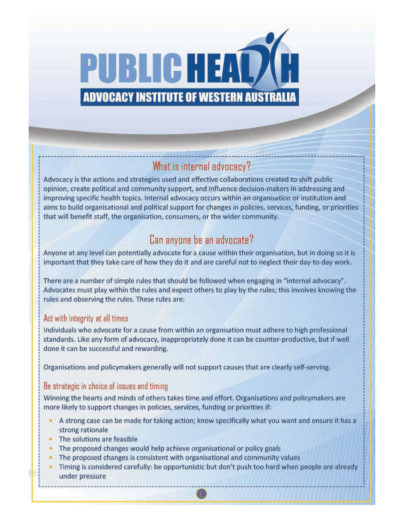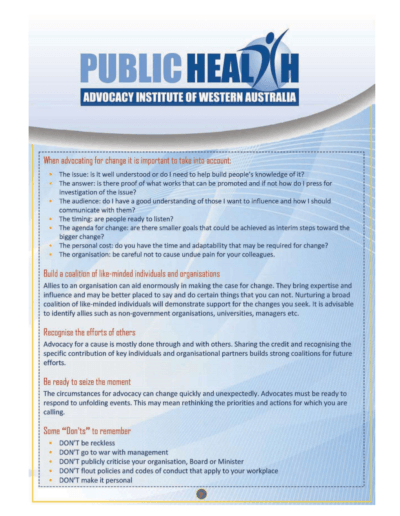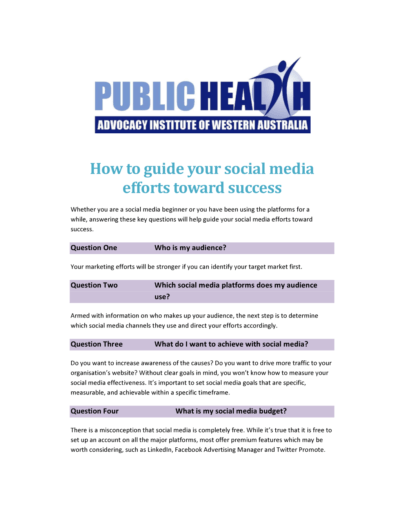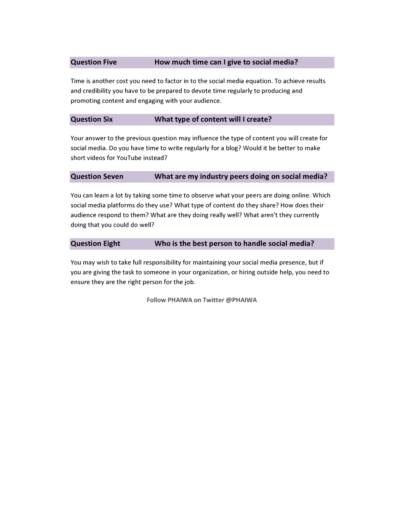The Advocacy Toolkit
The Advocacy Toolkit
The toolkit is a practical resource that supports and encourages health professionals and interested organisations to engage in advocacy. The Advocacy in Action toolkit:
- Demystifies advocacy,
- Includes examples and case studies demonstrating how advocacy strategies can be applied across different issues,
- Offers tips to effectively work with the media, and
- Provides practical tools to help you and your organisation advocate on your issue.
The fourth edition of the Advocacy in Action toolkit, released in 2019, features more examples and case studies, a comprehensive guide to evaluation, and more tips on working with the media.
To download the toolkit click here.
Does your organisation publish a newsletter?
Please consider including a notice about the availability of this free resource in your organisation’s next newsletter. A newsletter release is available here.
Policy Development Resources
The Delphi Process for Public Health Policy Development: Five things you need to know prepared by Gemma Devenish, Christina Pollard and Deborah Kerr, for the Food Law, Policy and Communications to Improve Public Health Project.
A short factsheet about internal advocacy was also developed by PHAIWA to provide advice on advocating for change within an organisation.
Media Advocacy
PHAIWA and our staff have regular contact with the media. Getting your issue heard is one of the cornerstones to good advocacy strategy.
To read more about how to develop a press release or talk with the media, download a copy of the PHAIWA Advocacy in Action Toolkit 4th Edition or the PHAIWA Advocacy in Action Toolkit 3rd Edition.
PHAIWA also run media skills workshops throughout the year, if you are interested in attending a workshop, please see the Professional Development and Capacity Building page on this website.
PHAIWA’s Top 10 Tips for Media Advocacy:
1. ‘Have a story’ to sell.
2. Have at least 3 strong points on the issue. Stick to them. Limit jargon and statistics
3. Identify key ‘sound bites’ that make your story interesting.
4. Be clean and assertive about your story
5. Make it clear if it is a general release vs “exclusive”
6. Time it right
7. Ensure those quoted can be contacted
8. Think visual
9. Size does matter – keep it concise
10. Get to know your media but avoid pestering. Find out how the media like to receive information.
If you are keen to learn more about using social media, click here.
If you want some useful tips on using Twitter at your next health event, read this blog.
Your Shout: Helping You Take Action on Alcohol
If you are concerned about alcohol-related harm among young people, you can do something about it! Your Shout is an exciting online toolkit that aims to support community members to take action on alcohol by providing the latest news, facts and stats, common myths, tips on taking action, examples of what others have done to address alcohol issues, and a space to share your tips and experiences.
The website also includes tips on how you can prevent alcohol-related harm in your community. There is something for everyone, depending on how involved you want to get. Visit Your Shout at www.shareyourshout.com.au and start taking action on alcohol.
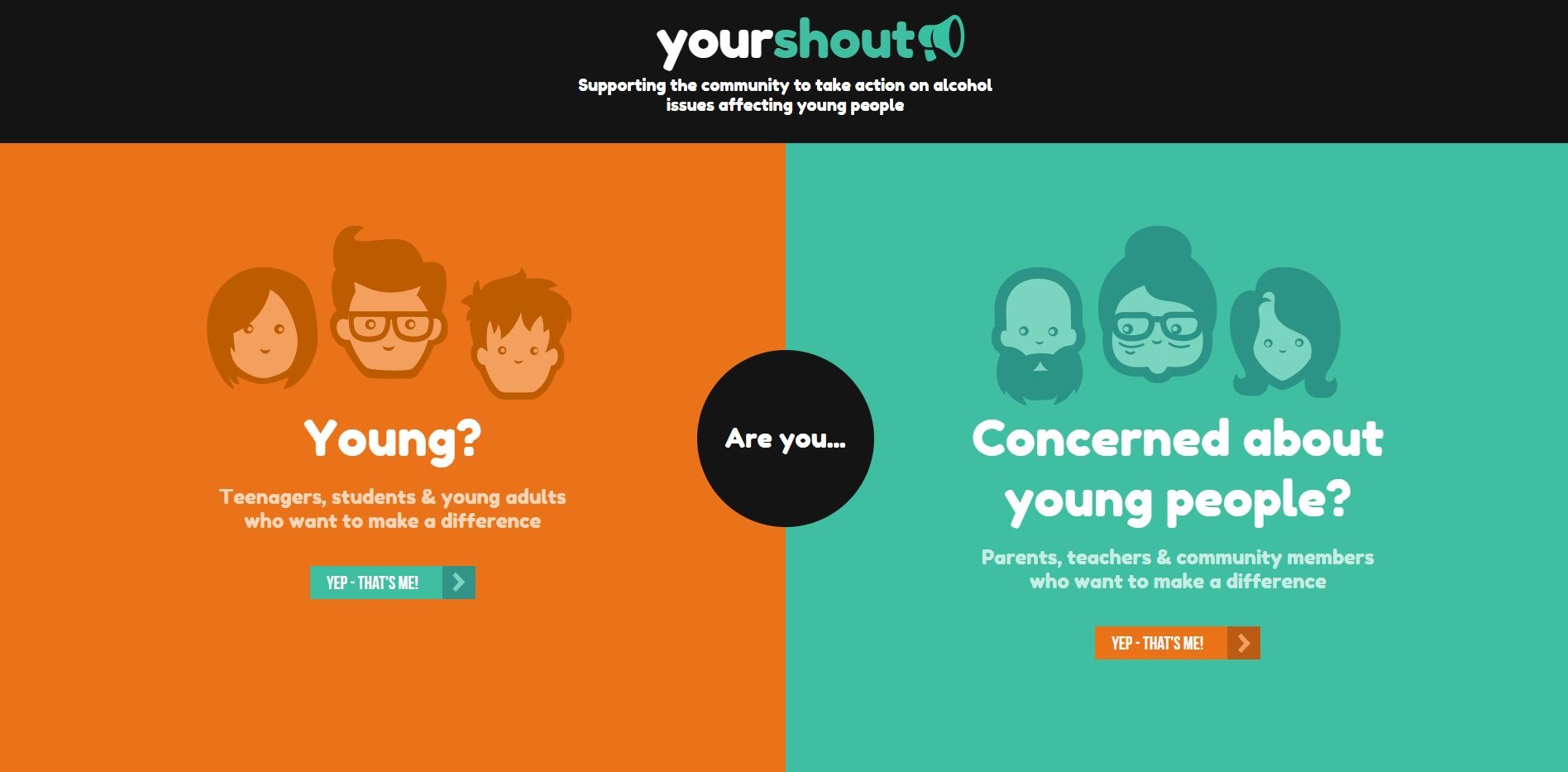
Lobbying Politicians
Do you feel strongly about public health issues in Western Australia? You can voice your opinion on an issue by getting in touch with politicians in federal, state or local government. An effective way to advocate for change is to write a letter or email regarding a public health issue that you feel strongly about and sending it to someone who can make a difference.
Writing an email or letter.
For examples of how to write a letter or email to a Member of Parliament, follow this link.
Hints and Tips:
Check your facts on the issue before writing a letter.
- Get the timing right
- Address the Member of Parliament correctly (for more hints see below)
- Be passionate, persistent and courteous
- Make sure your message is clear
- How to address politicians: To check that you have addressed the representative correctly, follow this link to the WA Parliament website.
- For more information about contacting Federal politicians and how to address Senators and Federal Members, follow this link to the Parliament of Australia website.
Your representatives
If you wish to contact your local member of Parliament, please visit the following websites for up-to-date contact information:
Members of Parliament – WA Government
Members of the Australian House of Representatives
Members of the Australian Senate
Contact your local council
If you are unsure about which state or federal electorate you belong to, or your local government, please visit the Electoral Boundaries website.
If you would like the State Government Ministerial Offices Contact List, you can download it here.
Relevant Ministers
Local Government – WA
Contact your local council here.
State – WA
Premier of Western Australia
The Hon. Mark McGowan BA LLB MLA
Email: wa-government@dpc.wa.gov.au
More information here.
Minister for Health
The Hon. Roger Cook BA GradDipBus MBA MLA
Email: Minister.Cook@dpc.wa.gov.au
Minister for Mental Health
The Hon. Roger Cook BA GradDipBus MBA MLA
Email: Minister.Cook@dpc.wa.gov.au
More information here.
Minister for Aboriginal Affairs
The Hon. Ben Wyatt LLB MSc MLA
Email: Minister.Wyatt@dpc.wa.gov.au
More information here.
Federal
Minister for Health
The Hon. Greg Hunt MP
Email: Greg.Hunt.MP@aph.gov.au
More information here.
Minister for Indigenous Australians
The Hon. Ken Wyatt AM MP
Email: Minister.Wyatt@health.gov.au
More information here.
Minister for Families and Social Services
Senator the Hon. Anne Rouston
Email: senator.ruston@aph.gov.au
More information here.
Prime Minister of Australia
The Hon. Scott Morrison MP
Contact and more information here.
The latest list of The Hon Scott Morrison MP Ministry can be found here.
Contact information for the Federal Cabinet is available by searching their name here.
The Advocacy Toolkit
The toolkit is a practical resource that supports and encourages health professionals and interested organisations to engage in advocacy. The Advocacy in Action toolkit:
- Demystifies advocacy,
- Includes examples and case studies demonstrating how advocacy strategies can be applied across different issues,
- Offers tips to effectively work with the media, and
- Provides practical tools to help you and your organisation advocate on your issue.
The fourth edition of the Advocacy in Action toolkit, released in 2019, features more examples and case studies, a comprehensive guide to evaluation, and more tips on working with the media.
To download the toolkit click here.
Does your organisation publish a newsletter?
Please consider including a notice about the availability of this free resource in your organisation’s next newsletter. A newsletter release is available here.
Policy Development Resources
The Delphi Process for Public Health Policy Development: Five things you need to know prepared by Gemma Devenish, Christina Pollard and Deborah Kerr, for the Food Law, Policy and Communications to Improve Public Health Project.
A short factsheet about internal advocacy was also developed by PHAIWA to provide advice on advocating for change within an organisation.
Media Advocacy
PHAIWA and our staff have regular contact with the media. Getting your issue heard is one of the cornerstones to good advocacy strategy.
To read more about how to develop a press release or talk with the media, download a copy of the PHAIWA Advocacy in Action Toolkit 4th Edition or the PHAIWA Advocacy in Action Toolkit 3rd Edition.
PHAIWA also run media skills workshops throughout the year, if you are interested in attending a workshop, please see the Professional Development and Capacity Building page on this website.
PHAIWA’s Top 10 Tips for Media Advocacy:
1. ‘Have a story’ to sell.
2. Have at least 3 strong points on the issue. Stick to them. Limit jargon and statistics
3. Identify key ‘sound bites’ that make your story interesting.
4. Be clean and assertive about your story
5. Make it clear if it is a general release vs “exclusive”
6. Time it right
7. Ensure those quoted can be contacted
8. Think visual
9. Size does matter – keep it concise
10. Get to know your media but avoid pestering. Find out how the media like to receive information.
If you are keen to learn more about using social media, click here.
If you want some useful tips on using Twitter at your next health event, read this blog.
Your Shout: Helping You Take Action on Alcohol
If you are concerned about alcohol-related harm among young people, you can do something about it! Your Shout is an exciting online toolkit that aims to support community members to take action on alcohol by providing the latest news, facts and stats, common myths, tips on taking action, examples of what others have done to address alcohol issues, and a space to share your tips and experiences.
The website also includes tips on how you can prevent alcohol-related harm in your community. There is something for everyone, depending on how involved you want to get. Visit Your Shout at www.shareyourshout.com.au and start taking action on alcohol.

Lobbying Politicians
Do you feel strongly about public health issues in Western Australia? You can voice your opinion on an issue by getting in touch with politicians in federal, state or local government. An effective way to advocate for change is to write a letter or email regarding a public health issue that you feel strongly about and sending it to someone who can make a difference.
Writing an email or letter.
For examples of how to write a letter or email to a Member of Parliament, follow this link.
Hints and Tips:
Check your facts on the issue before writing a letter.
- Get the timing right
- Address the Member of Parliament correctly (for more hints see below)
- Be passionate, persistent and courteous
- Make sure your message is clear
- How to address politicians: To check that you have addressed the representative correctly, follow this link to the WA Parliament website.
- For more information about contacting Federal politicians and how to address Senators and Federal Members, follow this link to the Parliament of Australia website.
Your representatives
If you wish to contact your local member of Parliament, please visit the following websites for up-to-date contact information:
Members of Parliament – WA Government
Members of the Australian House of Representatives
Members of the Australian Senate
Contact your local council
If you are unsure about which state or federal electorate you belong to, or your local government, please visit the Electoral Boundaries website.
If you would like the State Government Ministerial Offices Contact List, you can download it here.
Relevant Ministers
Local Government – WA
Contact your local council here.
State – WA
Premier of Western Australia
The Hon. Mark McGowan BA LLB MLA
Email: wa-government@dpc.wa.gov.au
More information here.
Minister for Health
The Hon. Roger Cook BA GradDipBus MBA MLA
Email: Minister.Cook@dpc.wa.gov.au
Minister for Mental Health
The Hon. Roger Cook BA GradDipBus MBA MLA
Email: Minister.Cook@dpc.wa.gov.au
More information here.
Minister for Aboriginal Affairs
The Hon. Ben Wyatt LLB MSc MLA
Email: Minister.Wyatt@dpc.wa.gov.au
More information here.
Federal
Minister for Health
The Hon. Greg Hunt MP
Email: Greg.Hunt.MP@aph.gov.au
More information here.
Minister for Indigenous Australians
The Hon. Ken Wyatt AM MP
Email: Minister.Wyatt@health.gov.au
More information here.
Minister for Families and Social Services
Senator the Hon. Anne Rouston
Email: senator.ruston@aph.gov.au
More information here.
Prime Minister of Australia
The Hon. Scott Morrison MP
Contact and more information here.
The latest list of The Hon Scott Morrison MP Ministry can be found here.
Contact information for the Federal Cabinet is available by searching their name here.


